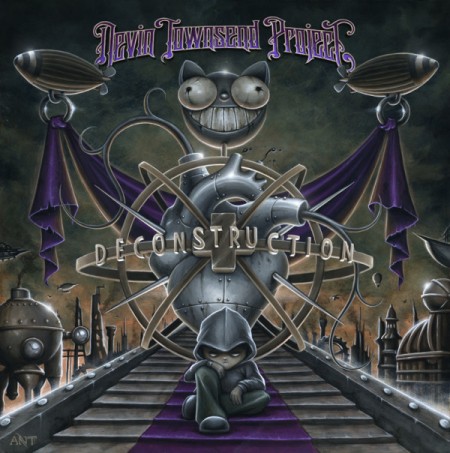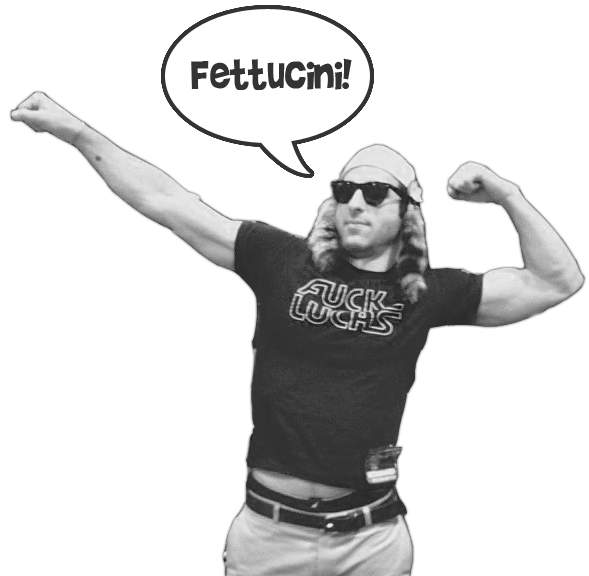Deconstructing Deconstruction
Thanks to the mind-warping that occurred while obtaining a Literature degree, there are times in which I can’t keep seem to keep myself from engaging in textual analysis. Whether I’m at the movies, in front of the TV, or curled up with a book, there’s no escaping the temptation to ruminate further, to dig deeper, to figure out what’s really going on. For better or worse, several analytic seeds have been planted in my brain-bone: authorial intent is irrelevant, structure is never as sound as it hopes to be, and genuine meanings must be extrapolated.
Truth be told, approaching texts this way can be frustrating as hell, capable of usurping all the pleasure that makes us want to experience them in the first place. But given the right piece, and the right circumstances, textual analysis can be fresh to death. Alas, I suppose it’s the academic equivalent of the `ole Peter Parker conundrum!
After giving it a few solid listen-throughs, I’ve come to the determination that the Devin Townsend Project’s Deconstruction is an album rich with meaning. So engorged is this album – sonically, lyrically, musically – that it almost demands to be subjected to an in-depth interpretation. And in an effort to entertain myself, and perhaps stumble upon something worthwhile along the way, that is what I’ve attempted.
Join me as I deconstruct Deconstruction.
Anyone that’s been following Devin Townsend knows how DTP was birthed. But if you have no clue, here’s the annotation:
Feeling as though that Strapping Young Lad had run its course, Hevy Devy decided to lay the band to rest rather than perpetuate his spiral into self-parody. After a brief stint doing only production work, Townsend created Ziltoid the Omniscient, a sci-fi meta-commentary metal album that (perhaps) reignited his passion for playing. He then decided to embark on the Devin Townsend Project odyssey – four albums of markedly varied musical styles, each recorded with a different band.
So where does Deconstruction fit into all of this? Well, it’s the third album in the sequence, succeeding the upbeat pop-metal stylings of Addicted and preceding the ethereally laid-back Ghost. Devin’s long been suggesting that this third entry would be a bombastic, over-the-top examination of metal itself:
[via]
“Deconstruction is a hard one to describe. The more I do, it just sounds like a journey up my own ass in a lot of ways. The bottom line with it is it is a very complicated and interesting record with a lot of dynamics and music that is very heavy even for me. It is a really heavy and complicated record but not a typical metal record. It is more of a symphonic type of thing I am trying to do, whether I succeed someone else will have to judge. I want to include a lot of different musicians in the metal genre that can do the vocals that I am not good at, like death metal vocals. When I do death metal vocals, I sound like Super Grover. Having those type of people do it is the same as having Anneke on Addicted.”
One might postulate that Deconstruction is Devin Townsend’s attempt to unravel the meaning behind heavy music by pushing it to its most hyperbolic state. In fact, this becomes clear even before listening to a single note – with four tracks surpassing the nine-minute mark (one of which is more than sixteen minutes in length) and a veritable all-star guest list, the album is daunting to even the most seasoned of headbangers. These tunes are not designed for the radio-friendly masses, but for the leather-clad, greasy-haired rockers who think they’re heavy as fuck.
But Deconstruction is less of concerned about appeasing these maniacs than challenging them. After years of being heralded as the heaviest Devin Townsend collection of all-time, the opening track (Praise the Lowered) greets the listener with three minutes of pure electronica. Sure, shit hits the fan and the double bass-drums explode after that, but the uneasiness has already been inception’d. From this point, one cannot reasonably expect to traverse the well-worn paths. Instead of take on the freeway, Metal-Virgil has tossed Listener-Dante into the trunk of his Elysian Station Wagon so that they can break the speed limits on the back roads. More twists. More turns. More danger.
Again, I consider myself a fairly well-versed fan of metal, yet this album positively confounded me with its sonic boom. Applying Devin’s signature wall-of-sound production to the constantly-transforming array of riffs, Deconstruction is akin to trying to interpret a foreign language while the speaker screams faster than Bizzy Bone raps. After the first listen, I sat back and muttered, “Well, that was awesome…what the hell just happened?” Since the first experience, I’ve been listening incessantly in a variety of settings (personal stereo, car stereo, high-quality headphones), and I’m discovering new things each time. I’d love to see studio’s audio-files, because I’m pretty certain that each tune probably has about a fah-zillion tracks.
Musically, this is the most complicated stuff I’ve ever heard from Devin Townsend – none of his projects excepted. The guitar shreddery is exaggerated, with sweeps (and bleeps and creeps!) dancing throughout throughout the entire album. Townsend also laid down the bass (which is syrup-thick and punchier than a Tyson highlight reel) and the synths, which are alternately dazzling like Jordan Rudess and atmospheric à la Kevin Moore. Additionally, it becomes evident quickly as to why the drumming talents of both Ryan Van Poederooyen and Soilwork’s Dirk Verbeuren were summoned; heavy grooves following grinds following blasts following heavy breakdowns. To my ears, RVP shines most on Planet of the Apes while Verbeuren’s most frenzied festival is Sumeria – these two tracks showcase the versatility and that Townsend required for the project.
But as intimated above, it isn’t the sheer brutality that really sets the album apart. No, it’s the defying of convention (or mayhaps more appropriately, its subversion through Nth degree-amplification). These nine tracks yank the thrasher by the collar and scream in his face, “You think you like heavy music? What if a symphony’s playing alongside it? Do you like it now?! How about if there’s a choir? Is that still metal? What if we sing about cheeseburgers?”
That’s right – the title track is about the deconstruction of a cheeseburger. And I’m fairly certain it’s genius.
Lyrically, Deconstruction is a self-aware masterpiece that hints at an overarching narrative while providing a profusion of evocative lines. Devin’s explained the album to be a cohesive tale about one man’s journey to Hell to learn the secrets of the universe; this voyage proves futile because enlightenment requires the consumption of a cheeseburger. Which is awesome, but the pilgrim just so happens to be a “vegi-ma-tarian.” This could very well be Townsend’s acknowledgment that even if he tries to usher us towards a conscious understanding of why we crave the music we crave, the answer is elusive. Is there a reason we seek out art? Probably. But can we ever consciously quantify why? Maybe.
Maybe not.
So while there’s a concept afoot, I also think that each track can be examined individually. For example, The Mighty Masturbator is Townsend’s tongue-in-cheek acceptance of what he must become in order to succeed as a musician. Especially towards the tail-end of SYL, Townsend’s always been weary of being celebrated simply for his technical prowess – not only does it foster an overinflated sense of self-worth, but it’s also ultimately boring and has very little to do with great songwriting. In fact, the fan-favorite Ziltoid could be viewed as a commentary on this, a parody of the self-parody that Devin Townsend wanted to avoid perpetuating.
The Mighty Masturbator continues this condemnation of expectations. By placing hilarious lyrics on top of absolutely mind-bending sections of time-signature shifts and shredding, there is a message of conflicting ideologies being conveyed. Consider the fact that with a hillbilly-simpleton’s voice, Townsend spits out a solution to all of his problems:
“oh I reeeal good at dat savin’ da world thing dere…oh yeah, I got my special savin’ da world boots…”
So what is this plan? What ace does the musician have up his sleeve?
“Ladies and Gentlemen!” Egads! Astounding! MY WORLDS!! Ladies and Gentlemen, I now see my life’s purpose: I AM THE MIGHTY MASTURBATOR!!!”
With self-deprecating analogs like Ziltoid and the Mighty Masturbator, Devin Townsend is able to play incredibly complicated music while simultaneously acknowledging the inherent silliness. The teen-rockers in us love to see wanking over instruments. But as we mature, we can step back and ask, “What’s the point?” And I think that on some levels, this may be the very message of Deconstruction: the acceptance that we can (and should) have fun with complex, technical music, but that we shouldn’t take it too seriously.
Which can be a tough message to swallow for many fans, myself included. To me, Deconstruction is a seriously awesome album, one that I’ve attempted to analyze but haven’t even scratched the surface. So maybe I should’ve heeded the very advice I’m speculating that the album is doling out.
Sometimes the search for understanding comes up short. So live in the moment, and enjoy what you can while you can. Maybe greater purpose has to be arrived at organically. The aforementioned years of textual analysis may help inform my perspective, but they shouldn’t constitute my perspective. Art is meant to be experienced, enjoyed, and perhaps even contemplated, but not to the point of losing its lustre.
Or maybe I just need to shut up, eat a cheeseburger, and listen to Deconstruction.





